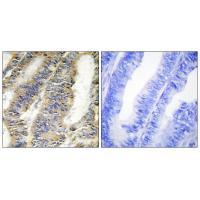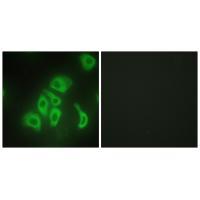Product Detail
Product NameTNFA Antibody
Host SpeciesRabbit
ClonalityPolyclonal
PurificationThe antibody was affinity-purified from rabbit antiserum by affinity-chromatography using epitope-specific immunogen.
ApplicationsIHC IF
Species ReactivityHu Ms
SpecificityThe antibody detects endogenous levels of total TNFA protein.
Immunogen TypePeptide
Immunogen DescSynthesized peptide derived from internal of human TNFA.
Target NameTNFA
ConjugateUnconjugated
Other NamesProtein name Tumor necrosis factor [Precursor]; TNF-alpha; Tumor necrosis factor ligand superfamily member 2; TNF-a; Cachectin
Accession NoSwiss-Prot: P01375
NCBI Gene ID: 7124
Uniprot
P01375
Gene ID
7124;
Sdspage MW26kd
Concentration1.0mg/ml
FormulationRabbit IgG in phosphate buffered saline (without Mg2+ and Ca2+), pH 7.4, 150mM NaCl, 0.02% sodium azide and 50% glycerol.
StorageStore at -20˚C
Application Details
Immunohistochemistry: 1:50~1:100
Immunofluorescence: 1:100~1:500
Immunohistochemistry analysis of paraffin-embedded human colon carcinoma tissue, using TNFA antibody #33648.
Immunofluorescence analysis of HepG2 cells, using TNFA antibody #33648.
Cytokine that binds to TNFRSF1A/TNFR1 and TNFRSF1B/TNFBR. It is mainly secreted by macrophages and can induce cell death of certain tumor cell lines. It is potent pyrogen causing fever by direct action or by stimulation of interleukin-1 secretion and is implicated in the induction of cachexia, Under certain conditions it can stimulate cell proliferation and induce cell differentiation. The TNF intracellular domain (ICD) form induces IL12 production in dendritic cells.
Neville M.J., J. Immunol. 162:4745-4754(1999).
Xie T., Genome Res. 13:2621-2636(2003).
Kim Y.J., Hum. Mol. Genet. 12:2541-2546(2003).
If you have published an article using product 33648, please notify us so that we can cite your literature.
et al,Lactobacillus reuteri Alleviates Hyperoxia-Induced BPD by Activating IL-22/STAT3 Signaling Pathway in Neonatal Mice
, (2024),
PMID:




 Yes
Yes



